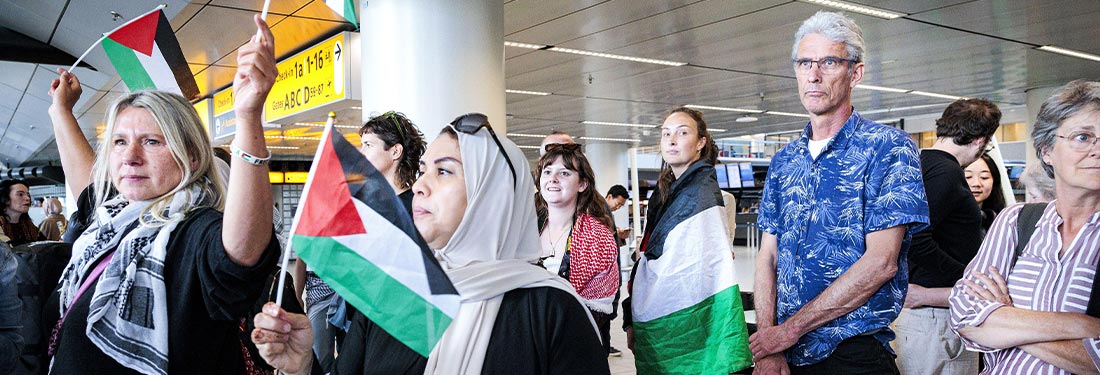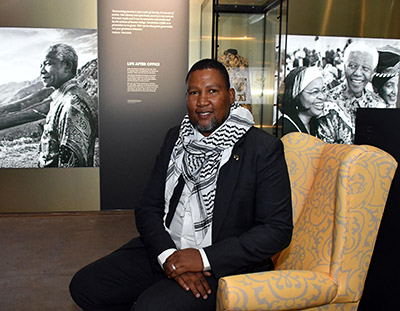Defender turns gatekeeper
Emad Mekay, IBA Middle East Correspondent, CairoMonday 14 July 2025

Participants in the Global March to Gaza depart for Egypt from Schiphol Airport in the Netherlands, 11 June 2025. Alamy.com/ANP RAMON VAN FLYMEN
Once a leader of Palestinian solidarity synonymous with Arab defiance, Egypt is cracking down on protests over the starvation of the people of Gaza and is enforcing the reporting blockade.
When Nkosi Zwelivelile Mandela, a South African lawmaker and grandson of a global icon for resistance, touched down in Cairo in an act of solidarity with the Palestinians, he wasn’t expecting to be expelled by a country once synonymous with Arab defiance. But Egypt today is a far cry from the pro-Palestinian nation it once was.
In June, Egyptian forces unleashed a harsh crackdown on international activists, including Mandela, for attempting to break Israel’s siege of Gaza. Authorities detained them at airports, dragged them from hotels, seized their passports and even unabashedly beat them on camera.
The crackdown came after Israeli Defence Minister Israel Katz warned that Israeli forces would stop the convoy if Egypt didn’t. Immediately after that, Egypt set up military checkpoints that choked parts of Cairo and the streets of Ismailia, a Suez Canal city that was meant to be a meeting hub for activists. Authorities stopped suspected participants, combed through their phones and interrogated them.
Spotlighting Gaza starvation
Mandela helped organise the march and was one of an estimated 4,000 people who were eventually forced to leave Egypt. Many still vowed to continue campaigning to draw attention to the starvation in Gaza.

Nkosi Zwelivelile Mandela visits an exhibition celebrating the life and legacy of his grandfather Nelson Mandela in London, UK on 7 February 2019. Alamy.com/Nils Jorgensen
Egypt said the march didn’t obtain the right permits. ‘These attempts violate Egypt’s national security and sovereignty, particularly as they come at a time when the entire region is witnessing an explosive war,’ said Speaker Hanafi Gebali of the government-appointed parliament.
Organisers of the 'Global March to Gaza' insist they are non-partisan, focused solely on delivering aid and spotlighting Gaza’s starvation. Organisers framed their mission as a grassroots challenge to collective punishment, with participants from 80 countries. Their planned 50-kilometre trek to Rafah from the Mediterranean city of Al-Arish aimed to mirror the ‘freedom marches’ of the civil rights era. They said they planned to demand a humanitarian corridor for food, medicine and water.
In June, the Freedom Flotilla Coalition’s ship, The Madleen, was intercepted by Israeli forces while attempting to deliver aid. Another small convoy from Lebanon pledged to join, though details remain unclear.
Many activists expressed incredulity that an Arab nation controlling Gaza’s only non-Israeli crossing would block aid. After deportations, organisers denounced Egypt for enabling Gaza’s ongoing siege. Other critics contend that Egypt has long been complicit in the siege, using rhetoric to mask inaction or, as some allege, collusion with Israel.
African civil society’s urgent appeal
In April, a coalition of African civil society organisations filed an urgent appeal to the African Commission on Human and Peoples’ Rights, seeking to refer Egypt to the continent’s human rights court over its role in enforcing the blockade of Gaza. The complaint argues that despite orders from the International Court of Justice mandating unhindered humanitarian access, Egypt has ‘knowingly and wilfully violated its obligations, as well as the humanitarian imperative’. By closing the Rafah crossing, it says, Cairo has contributed to what petitioners describe as ‘an unprecedented humanitarian catastrophe’, accusing the Egyptian government of ‘aiding and abetting Israel’s genocide in Gaza’.
Israel has forcefully denied allegations of genocide in Gaza, calling its military campaign a legitimate response to Hamas’ 7 October attacks. Israel maintains that it works to minimise civilian casualties and lacks genocidal intent, dismissing South Africa’s case at the International Court of Justice (ICJ) as unfounded and legally irrelevant. The ICJ, however, found it to be ‘plausible’ that Israel is violating its obligations under the Genocide Convention.
The filing with the African Commission on Human and Peoples’ Rights alleges that Egypt is in breach of its obligations under Articles 4, 12 and 20 of the African Charter on Human and Peoples’ Rights, as well as customary international law. The petitioners are calling for the immediate and sustained reopening of Rafah to allow for the evacuation of the wounded, the delivery of food, water and medical supplies and the safe passage of aid workers, doctors and relatives of those trapped in the besieged enclave.
Egyptian government officials contacted by Global Insight did not respond to requests for comment, and, at time of writing, the government in Cairo had yet to directly address the complaint to the African Commission accusing it of complicity in Gaza’s blockade. Publicly, Egypt portrays itself as a mediator and aid facilitator while blaming Rafah’s access issues on Israeli restrictions and its own security needs.
Nevertheless, after the outbreak of the war in Gaza, Reporters Without Borders found that Egypt was restricting journalist access through Rafah, reinforcing a ‘reporting blockade’ that it says aids Israel’s media control over the strip.
The crushed international Gaza march may prove a defining symbol of Egypt’s rupture with its past
Egypt’s modern policies mark a stark departure from its pro-Palestine past. The country once fought multiple wars with Israel and, even after peace, maintained a ‘cold peace’ policy in a bid to prod Israel to better treatment of the Palestinians.
In the 1960s, under its charismatic leader Gamal Abdel Nasser, Egypt championed the Palestinian cause with unmatched fervour. However, since Abdel Fattah el-Sisi came to power in a second military coup in 2013, suppression of pro-Palestine activism has reached unprecedented heights. Egypt’s military doctrine has now evolved from Arab unity to its own security, where Gaza’s suffering is just another variable in regional calculus.
After the start of the Israel–Hamas war, Egyptian security forces arrested scores of Egyptians who had protested in solidarity with Gaza and banned any public show of sympathy. Egyptian lawyer and rights activist Mahinour El-Massry was one of those arrested. She now says that at least a hundred other Egyptians who showed public support for Gaza remain detained.
Egyptian officials say they aim to maintain stability, focus on economic development and provide services for a population of 115 million citizens. Behind Egypt’s compliance lies cold pragmatism. The military regime relies on $1.3bn in annual US aid, fears Israeli security repercussions and prioritises regime control amid economic crisis. Once a gas exporter, Egypt now imports up to 15 per cent of its gas from Israel, a humbling reversal for a nation that once pushed for Arab energy independence.
Public fury over Palestine simmers, but street protests are rare because the forces that once galvanised mass dissent – mostly pan-Arabism and political Islam – have been methodically dismantled by decades of military repression. As public discontent grows and the country falls further into debt, the generals, entrenched since Sisi’s 2013 coup, appear far more concerned with self-preservation than with regional justice or humanitarian missions.
The crushed international Gaza march may prove a defining symbol of Egypt’s rupture with its past. Where Egyptian crowds once surged through Cairo’s streets chanting for Palestinian freedom, today’s sympathisers are hustled into unmarked vans or forced onto outbound flights.
Emad Mekay is a freelance journalist and can be contacted at emad.mekay@int-bar.org
